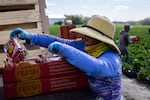
Carolina reviews the strawberry pints picked by farmworkers in a Sanchez Farm field in Plant City, Florida, U.S., February 28, 2024.
Eva Marie Uzcategui / Eva Marie Uzcategui for NPR
It’s early morning in this small agricultural town in Central Florida and the pickers are already hunched over the bushes, plucking strawberries, the main crop out here.
Fidel Sanchez instructs his workers to get rid of the fruit that fell and rotted on the ground.
There's a lot of it.
Like other farmers out here, Sanchez is worried about how long he will be able to keep his business going.
About a year ago, Florida Governor and then presidential candidate Ron DeSantis passed one of the toughest crackdowns on immigration in the country.
SB1718 punishes employers who use undocumented labor and forbids undocumented people from having a driver's license.
Many local Florida businesses say the new law has led to workers leaving the state, hurting their bottom line. "A lot of people are scared," says Sanchez. "A lot of people went north and never came back."
The Federal government estimates that nationwide over 40% of farmworkers are undocumented.
Sanchez says the effect of the law was immediate.
Families he'd worked with for 20 or 30 years were gone from one day to the next. "The government doesn't seem to care," he says. "Maybe they think the crops are gonna pick themselves."
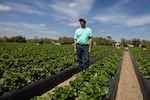
Fidel Sanchez, owner of Sanchez Farm, poses for a photo at a Sanchez Farm field in Plant City, Florida, U.S., February 28, 2024.
Eva Marie Uzcategui / Eva Marie Uzcategui for NPR
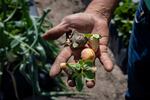
Fidel Sanchez, owner of Sanchez Farm, holds damaged pneberries at a Sanchez Farm field in Plant City, Florida, U.S., February 28, 2024.
Eva Marie Uzcategui / Eva Marie Uzcategui for NPR
The Florida Policy Institute estimates this immigration law could cost the state's economy $12.6 billion in its first year. That's not counting the loss of tax revenue.
A spokesperson for Florida Governor Ron DeSantis told NPR, "Governor DeSantis signed the most ambitious anti-illegal immigration law in the country to protect Floridians." They also stated that Florida can "still maintain a robust economy."
Ron Hetrick, a senior economist at Lightcast, a labor market analytics company says the problem is the state has a serious labor shortage.
The Pew Research Center estimates there are close to one million undocumented people.
Even if just a fraction of them were to leave, Hetrick says, "how do these cities get built? How do the houses get built? We all know very well how these things are being built."
Hetrick says what Florida is facing is symbolic of the larger reality in the country — where there is an aging population and politicians framing immigration as a threat rather than fixing a broken system.
"The future ... if you look at census projection for the growth of this country, once this boomer population goes through in the next, you know, 15 years ... without immigration, we shrink."
A spokesperson for DeSantis told NPR that businesses are still free to hire immigrants, as long as it's done legally.
In 2023 Florida hired thousands more H-2A guest workers than the year before. But farmers NPR spoke to said the bureaucracy, and the cost of applying for these work permits, is crippling. There have also been widespread reports of lack of oversight and exploitation of H2A workers.
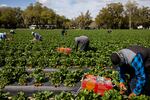
Farmworkers pick strawberries at a Sanchez Farm field in Plant City, Florida, U.S., February 28, 2024.
Eva Marie Uzcategui / Eva Marie Uzcategui for NPR
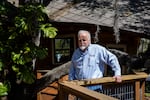
Gary Wishnatzki, third generation owner of Wish Farms, poses for a photo at Wish Farms in Plant City, Florida, U.S., February 28, 2024.
Eva Marie Uzcategui / Eva Marie Uzcategui for NPR
"The H-2A system is absolutely broken," says Gary Wishnatzki, head of Wish Farms, also in Plant City.
This is one of the largest strawberry growers in the nation. His field harvesters in Florida are on H-2A visas.
"It's the only means of getting workers at the farm right now", says Wishnatzki. "But it's totally outdated."
Even for a company as large as it is, the cost has become crushing, he says.
It has to pay a recruitment company, visa fees, housing workers, pay for meals, and transportation.
Unless something changes soon, he says, "berries are going to become an item that's going to be a luxury, not something people buy every time they go to the grocery store like they do now."
Related: International migrants attracted to large urban counties, Census Bureau data shows
The shortage of workers is not just impacting agriculture.
NPR spoke to hoteliers, construction business owners, and restauranteurs who said Florida's labor shortage, combined with arthritic national immigration policies, is hurting the bottom line.
"Years ago, you'd put an ad in a newspaper, you'd have you'd have a bunch of applications filled out. You'd have people lined up outside your door," says David Crowther, owner of CFS Roofing Services in Fort Myers.
Because Florida is in the path of hurricanes, roofing is in high demand here. In recent years, Fort Myers has been especially hard hit and Crowther says it's been a challenge to find workers at all levels, from management to roofers.
Crowther's company lost about 10 percent of its workers after Florida passed the SB1718 immigration bill in 2023. These workers were scared for the safety of their undocumented family members, he says.
Crowther says if he could hire more immigrant labor, it would ultimately trickle down into more jobs for American workers.
"If I knew I could get an unlimited supply of labor, I then would start hiring estimators and salesmen over to start promoting more work. It's a domino effect."
Crowther, along with the National Roofing Contractors Association, has been petitioning for an expansion of the H2B program, which provides temporary non-agricultural visas.
Related: An unprecedented year in immigration, and in anti-immigration rhetoric
Crowther says business is good. But it could be so much better if only he could find more workers.
For others in Florida, SB1718 brought a hard hit and threw the labor market into turmoil.
The law created a climate of fear that many had no option but to leave the state.
A few miles north, at a fruit market, a woman sitting in the cool shade of her fruit stand says, she dreams of leaving.
Ana Maria Perez got to Florida 20 years ago, but things have changed.
As a Latina and a business owner, she says it makes no sense to stay.
"It's real," she says. "Farms don't have the workforce they used to. So now the cost of fruit rose for us."
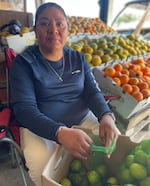
Ana Maria Perez says, SB1718 dealt a blow to her business, and gave way to a rise in anti-immigrant sentiment.
Jasmine Garsd / Jasmine Garsd/NPR
Perez started as a fruit picker when she came from Mexico. She says it was physically exhausting, so she stopped after she became a legal resident.
The fruit stand was supposed to be a step up, but once the law went into effect, "you should've seen it. The mangos and mameys falling to the ground. No one to pick."
Perez says next year, when her kid graduates college, she's planning to leave Florida. She's done. She shakes her head and gets back to packing some limes.
"We all lost out here," she says. "We all lost." `
Copyright 2024 NPR. To see more, visit https://www.npr.org.